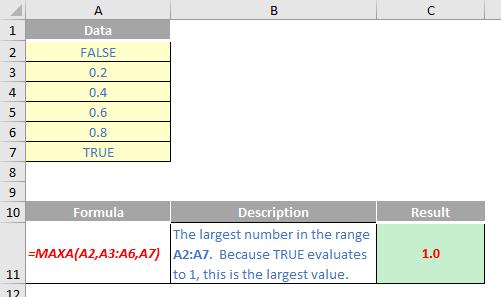A to Z of Excel Functions: The MAXA Function
17 January 2022
Welcome back to our regular A to Z of Excel Functions blog. Today we look at the MAXA function.
The MAXA function
The MAXA function returns the largest value in a list of arguments. It has the following syntax:
MAXA(value1, [value2], ...)
where:
- value1 is required and represents the first number argument for which you want to find the largest value
- value2, ... are optional arguments. These are numerical arguments 2 to 255 for which you want to find the largest value.
It should be noted that:
- arguments may be any of the following: numbers; names, arrays or references that contain numbers; text representations of numbers; logical values, such as TRUE and FALSE, in a reference
- logical values and text representations of numbers that you type directly into the list of arguments are counted
- if an argument is an array or reference, only values in that array or reference are used. Empty cells and text values in the array or reference are ignored
- arguments that are error values or text that cannot be translated into numbers cause errors
- arguments that contain TRUE evaluate as 1; arguments that contain text or FALSE evaluate as zero (0)
- if the arguments contain no values, MAXA returns zero (0)
- if you do not want to include logical values and text representations of numbers in a reference as part of the calculation, use the MAX function instead.
Please consider the following example:

We’ll continue our A to Z of Excel Functions soon. Keep checking back – there’s a new blog post every business day.
A full page of the function articles can be found here.

